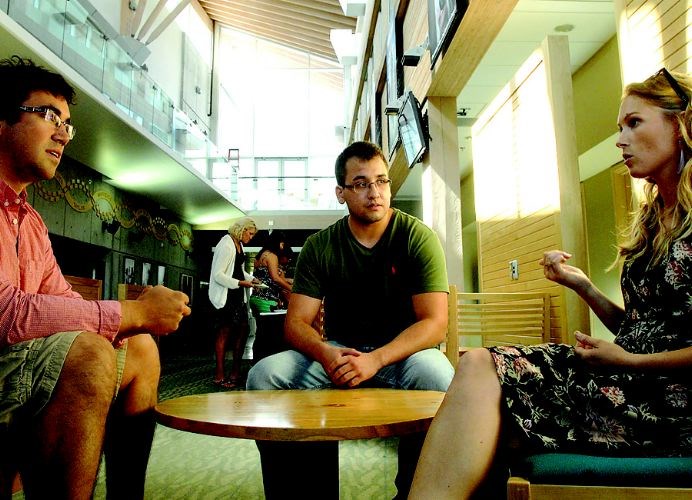Nathan Teegee was a high school student looking to soak up every morsel of information about medical school when he attended the first Aboriginals into Medicine pre-admission workshop a decade ago, now he's the one imparting his wisdom to prospective students.
Teegee is about to begin his second year in the Northern Medical Program, but was back at the school on Thursday to help current high school, undergraduate and masters level students learn more about what it takes to get into medical school.
"It really motivates you, being with a group of people that are doing the same thing," Teegee said of the three-day workshop. "Then you want to go back to high school and rock those provincial exams and you want to get into a university and you set your path forward."
A dozen Aboriginal students from across the country descended on Prince George for the workshop to learn tips on everything from studying for entrance exams to how to prepare for an admissions interview.
"You get a lot more out of it than if you fire out an email to somebody and you get a real technical response," University of Victoria undergraduate kinesiology student Tyler Desorey said. "You can draw on lots of different people's knowledge."
Desorey came to the workshop seeking to find out more about how to prepare his application, what type of volunteer activities he should pursue and what are the best courses to take as an undergrad to prepare himself for medical school.
UBC holds the workshop annually at one of its four medical school campuses in Vancouver, Victoria, Kelowna or Prince George. Some prospective medical school students, like Baillie Redfern, are back at the workshop for a second year to learn more about the program and visit another campus.
"When it comes down to making a decision as an applicant, I have experience at all of those campuses," she said. "It really encourages Aboriginal students to explore their options within the province, whether it be interior, on the island, on the coast or up north."
The UBC workshop is modelled off a similar program run out of the University of North Dakota, which has had great success in recruiting more Aboriginal doctors. Progress is also being made at UBC, according to workshop co-ordinator James Andrew.
On average there are around eight to 10 Aboriginal students accepted into UBC's medical program each year, with an all-time high of 13. Those figures have increased dramatically over the past 10 years. Prior to that the faculty often received one or two applications a year from Aboriginal students and sometimes years went by without anyone being accepted.
The workshop attracts 10 to 15 students a year and the costs, aside from travel, are covered by the faculty of medicine. Of all of UBC's Aboriginal medical students and graduates over the last 10 years, 42 per cent have taken the pre-admission workshop.
Students interested in attending the workshop need to fill out an application form, provide proof of ancestry and write an essay.
More Aboriginal medical students could lead to more physicians who are willing to work in undeserved rural and remote communities.
"One of the goals of this is to have doctors who are practicing rural medicine or in rural areas," Redfern said. "Most of the applicants are from small towns or reserves, so by encouraging them to come into medicine there is a high likelihood that they're going to go back into their communities and help their communities."
In addition to finding the ins and outs of the medical school application process and meeting Northern Medical School staff, the prospective students also get a chance to experience Prince George and the northern campus. They're planning to take in a number of local attractions from the BCNE to the ancient forest.
Teegee also made his sales pitch for the Northern Medical Program, pointing out benefits like smaller class sizes and one-on-one mentoring with physicians. In his first year he said he was able to do more hands-on procedures than some of his UBC classmates at bigger sites.
"Hopefully I can convince more [to join the Northern Medical Program]," he said. "At least one more."



